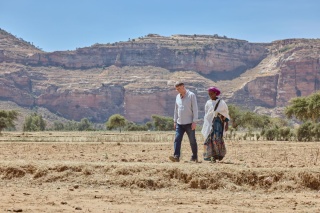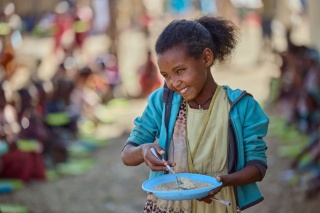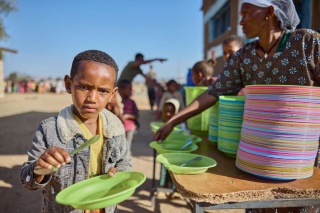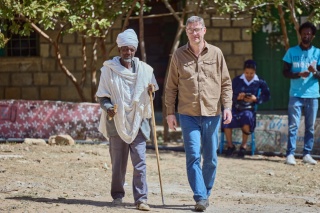
Why the Band Aid debate is focusing on the wrong thing
Have we not learned lessons from the past?
Band Aid’s release of a 40th anniversary remix of Do They Know It’s Christmas has provoked a round of familiar criticism. Initiatives like this, it is claimed, "perpetuate damaging stereotypes that stifle Africa’s economic growth … costing the continent trillions and destroying its dignity, pride and identity", whilst the use of "dehumanising imagery ... fuel[s] pity rather than partnership."
At the international charity Mary’s Meals, our whole approach is based on partnership working and the belief that those who require support can become the principal builders of a better future for all. So, as its founder, it might be assumed I would have sympathy for these views. But the latest round of this recurring argument is provoking a very different feeling in me.
Mary’s Meals – a global movement of people working together
In 1985, whilst watching the original Live Aid concert as a teenager, I found myself moved to make my very first donation to a charity. The deeply disturbing images of emaciated children in Tigray, Ethiopia, accompanied by an impassioned, expletive-laden plea by Bob Geldof, moved my young friends and I to act.

I could never have imagined that four decades later I would find myself in Tigray, Ethiopia, face to face with similarly gaunt children suffering acute malnutrition amidst another unfolding famine.
In the years between these two events, I had spent a lot of time in many of the world’s poorest countries with Mary’s Meals – an organisation that sets up school feeding programmes in partnership with communities, in areas where millions of children are missing their education because of hunger. The daily meals we serve to more than 2.4 million children every school day meet the children’s immediate need for food and encourage them into the classroom, providing an opportunity for education and a possible ladder out of poverty.
Key to the success of this initiative is that all these programmes are organised by local partners and staff and the day-to-day running of the programme is taken on by local volunteers. Many of the volunteers involved in our work have experienced hunger and poverty themselves but choose to gift their time to the programme because they can see that these school meals are transforming the lives of children in their communities. Mary’s Meals is not a solution imposed by people in the global north, rather it is a global movement of people working together with the same goal – that every child in this world might at least eat one meal every day in school.

I spoke with many Tigrayans, all of whom had recently experienced the pain of hunger
Ethiopia is living through a humanitarian disaster
We have been running a programme like this in Tigray since 2017 and several months ago I visited our partners there for the first time in many years. The brutal two-year conflict and blockade that closed off the region from November 2020, and the current humanitarian disaster in its aftermath, have gained little attention. Around 600,000 people died in the conflict, a number that dwarfs the death toll of much more prominent wars of our time. Adding to the enormity of the necessary recovery, a prolonged drought has created an enormous hunger crisis with over 4.5 million people in urgent need of food aid.
I spoke with many Tigrayans, all of whom had recently experienced the pain of hunger – doctors and government officials included. In desperate times, hunger does not respect class or economic background. A medical student, who grew up in a middle-class family, cried as she told me of the humiliation of queuing for food aid. I spent time with former business owners who are having to beg each day to survive.
In a school playground I chatted with two 10-year-old girls who told me they were only in class because of Mary’s Meals. I was heartened to see that the meals were having the desired impact. And then my heart broke when I learned that those same two girls had been sharing their school meal each day with hungry children begging at their school gate – despite their own uncertainty about whether there would be any food at home later that day.

Many Tigrayans referenced the famine of the 1980s (the one which sparked Live Aid and took the lives of up to one million people). All of them said they feared this time could be worse – unless the world acts. Some remembered what the musicians had done back then and asked me why no one was helping this time.
The people of Tigray need urgent action
I returned home, determined to raise awareness of the situation. I was hopeful there would be great interest in this largely unreported humanitarian crisis and that people would respond generously if they only knew what was happening. I was only half right. In the months since, supporters of our work, including the Band Aid Charitable Trust, have indeed responded incredibly generously and as a result, more than 110,000 children are now eating Mary’s Meals in Tigray each day, compared with around 30,000 at the beginning of the year.
But I have also been shocked by the indifference beyond that. Most people still don’t know there is a crisis in Ethiopia. It seems Tigray is no longer a place of interest on the global agenda, even when 90% of its population is in urgent need of food aid, the silence is deafening.

Meanwhile, the words of that "little pop song" can still create a noise. The debate about Band Aid’s song and the way it portrays the lives of people in Africa has once again made headlines. That this causes more outrage than the reality of hunger and potential famine is disturbing. More than ever, we need to keep our focus on the very real problems facing people in Tigray and beyond.
It is not initiatives like Band Aid that "destroy dignity, pride and identity" in Africa. More than anything, it is hunger that does that. And if we are shocked into action by some of the stories we hear from Tigray and beyond, is that such a terrible outcome? Thankfully, not everyone in Africa would recognise themselves in the images of Band Aid’s video. That does not mean that it is not happening to some or that we shouldn’t do something about it.
The people of Tigray – and those living in too many other hunger hotspots around the world – need answers. They need action. Let’s focus our energies on fighting this common enemy: hunger.
Magnus MacFarlane-Barrow is the founder and CEO of Mary's Meals.
It costs just £19.15, €22, $25.20 USD or $31.70 CAD to provide a child with school meals for an entire school year. Learn more about our work in Ethiopia, and how the promise of a daily meal at school enables the children we serve to receive an education.
